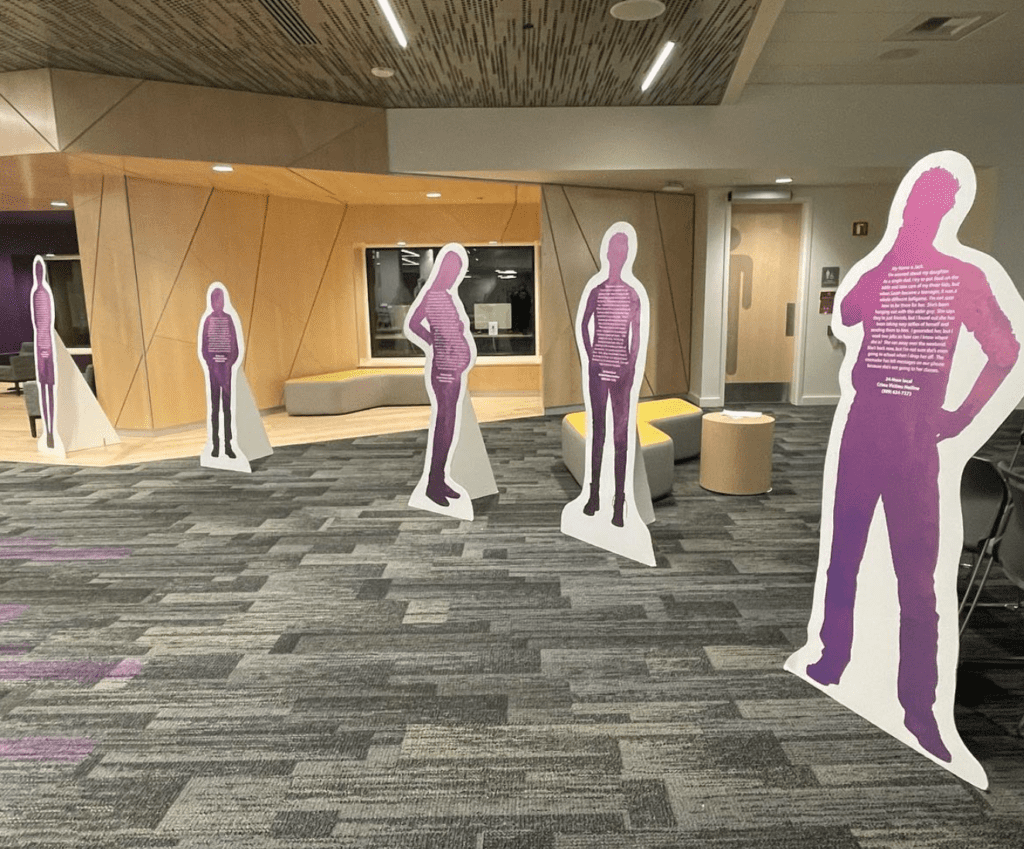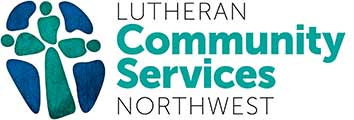LCSNW victim advocates join fight against human trafficking

Abigail Dougherty of LCSNW Spokane spoke at a Jan. 11 human trafficking educational event hosted by LCSNW at the Spokane Public Library. These silhouette cut-outs told the stories of human trafficking victims.
Human trafficking is a global problem that shows up in local communities. During Human Trafficking Prevention Month in January, we spoke with Abigail Dougherty, a Crime Victim Advocate in the LCSNW Spokane office, about the signs, causes and options for victims of this crime. The Spokane office operates the Community Sexual Assault program and the Crime Victim Service Center, making them a valuable community resource on these issues.
What is trafficking? Abigail cites this definition: Human Trafficking is a crime involving the exploitation of a person for labor, services, or commercial sex through the use of force, fraud, or coercion. These factors are not required to consider a minor trafficked.
What are common threads in trafficking cases? Control, coercion and the victim’s vulnerabilities. It is almost never done by a stranger. Abigail says it’s almost always done by someone who knows the victim, such as a family member or intimate partner. Traffickers are known to groom their victims to gain their trust. With labor-motivated trafficking, the commercial gain might not be money, but life essentials such as food and shelter. Issues of poverty and familiarity can make recovery for victims much more complex. “But it’s important to know that it is never the victim’s fault, no matter what vulnerabilities they have.”
How common is trafficking? Worldwide, 27.6 million persons are estimated to live under control of a trafficker. In Washington state, there were 1,000 reported cases between 2016 and 2020, with numbers on the rise. Thousands of cases are never reported.
Abigail currently has three known clients who are trying to leave trafficking situations. Clients come to LCSNW via different sources and referrals:
-
When individuals have a sexual assault exam.
-
Other nonprofits.
-
24/7 Sexual Assault support line.
-
Spokane County juvenile courts and detention.
Some signs of possible trafficking:
-
Lack of control and access to personal belongings, such as cellphone, money they are earning or important identification documents.
-
Victims are monitored by their abuser.
-
An individual being secretive about who they are hanging out with or what they are doing.
-
Possessing items outside their personal means – ipads, expensive purses, etc..
-
Change in behavior.
-
Sleep deprivation.
-
Signs of physical abuse or mistreatment.
What can you do? Abigail says if you ever suspect a trafficking situation, do not intercede and risk your personal safety. Instead:
-
Contact police.
-
Reach out to the National Human Trafficking Hotline (see below).
-
In the Spokane area, email the FBI Tipline.
How does LCSNW help? Abigail says victims find LCSNW services in a number of ways, often by referral or the LCSNW web page:
-
Emergency rooms.
-
Other nonprofits.
-
LCSNW’s sexual assault support line.
-
Juvenile courts and law enforcement.
Resources
National Human Trafficking Hotline, operated by the Polaris Project
-
24/7 365 Call, text, and live chat options – all confidential
-
Call: 1-888-373-7888
-
Text: 233733
FBI Tip Line – for the Spokane area
LCSNW Community Sexual Assault Program (CSAP)
▫ 24/7/365 Sexual Assault support
⬝ 509-624-7273

0 Comments